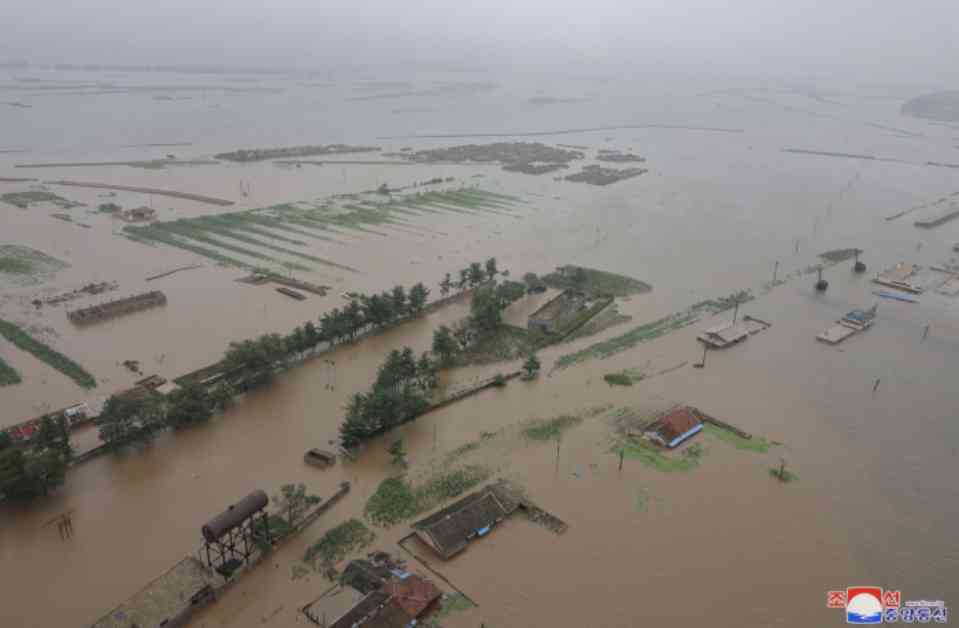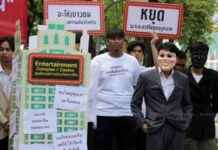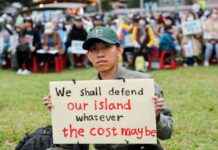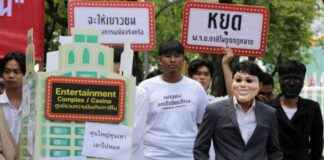North Korea’s recent handling of the devastating floods in its northern region has sparked outrage and condemnation on the international stage. The country’s response to the natural disaster, which claimed the lives of thousands, has led to the execution of multiple government officials deemed responsible for incompetence in the flood response efforts.
The flooding, which occurred in late July following heavy rainfall from Tropical Storm Gaemi, wreaked havoc in North Korea’s northern region, particularly in Jagang province. The extent of the damage was catastrophic, with thousands of lives lost and significant destruction to homes, infrastructure, and farmland. The city of Sinuiju and the nearby county of Uiju were among the hardest-hit areas, with about 4,100 homes damaged and approximately 3,000 hectares of farmland wiped out.
Despite the severity of the situation, North Korean leader Kim Jong Un took swift action by convening an emergency Workers Party meeting to address the crisis. During the meeting, he vowed to hold accountable those officials who had “severely neglected” their duties, leading to the loss of lives and widespread devastation. As a result, around 20 to 30 regional government officials in the flood-affected area were executed by firing squads as a form of punishment for their incompetence.
The execution of the officials sent shockwaves through the region, drawing attention to the authoritarian regime’s harsh and unforgiving approach to governance. While Kim Jong Un’s regime attempted to portray a sense of control and leadership in the aftermath of the disaster by distributing propaganda images of the leader overseeing rescue efforts, the reality of the situation painted a much bleaker picture.
South Korea’s National Intelligence Service closely monitored the developments in North Korea following the floods, obtaining intelligence related to the situation. The exact death toll from the flooding remains unclear, with estimates suggesting that the casualties may number in the thousands. The discovery of bodies during the clearing of soil after the water receded further highlighted the devastating impact of the natural disaster on the region.
As the international community grapples with the aftermath of the floods in North Korea, questions arise about the country’s ability to effectively respond to such crises and protect its citizens. The execution of government officials for their perceived incompetence in the flood response raises concerns about the lack of accountability and transparency within the regime.
The Impact of the Floods
The floods in North Korea’s northern region had a devastating impact on the affected areas, causing widespread destruction and loss of life. The city of Sinuiju and the nearby county of Uiju bore the brunt of the flooding, with thousands of homes damaged and farmland destroyed. The damage to infrastructure, including roads and rail links, further exacerbated the challenges faced by rescue and relief efforts in the aftermath of the disaster.
The extent of the devastation in Jagang province, which borders China and is home to the upper and middle reaches of the Yalu River, was particularly severe. The flooding in this region resulted in significant loss of life, with reports indicating that bodies were discovered during the cleanup operations after the waters receded. The sheer scale of the disaster overwhelmed local authorities and highlighted the inadequacies in the country’s disaster response capabilities.
The economic impact of the floods on North Korea’s already struggling economy is likely to be significant, with the destruction of farmland and infrastructure posing long-term challenges for the country’s recovery efforts. The loss of livelihoods and homes for thousands of residents in the affected areas further compounds the humanitarian crisis unfolding in the wake of the natural disaster.
International Response and Concerns
The international community’s response to the floods in North Korea has been mixed, with some countries offering aid and support to assist in the relief efforts. However, concerns have been raised about the regime’s handling of the crisis and the lack of transparency in reporting the extent of the damage and casualties. The execution of government officials for their perceived incompetence has drawn criticism from human rights organizations and foreign governments, who view the punitive measures as excessive and inhumane.
The harsh and authoritarian response to the flooding highlights the challenges faced by the North Korean population in times of crisis and the limitations of the regime in protecting its citizens. The lack of accountability and transparency in the regime’s governance has long been a source of concern for the international community, and the events following the floods only serve to underscore these concerns.
As North Korea grapples with the aftermath of the devastating floods, questions remain about the country’s ability to recover and rebuild in the face of such challenges. The execution of government officials for their perceived incompetence in the flood response raises broader questions about the regime’s priorities and values, and the impact of such actions on the country’s governance and stability.
In conclusion, the floods in North Korea’s northern region have exposed the vulnerabilities and shortcomings of the regime’s disaster response capabilities, leading to widespread destruction and loss of life. The execution of government officials for their perceived incompetence in the flood response has raised concerns about the regime’s authoritarian governance and lack of accountability. As the country grapples with the aftermath of the disaster, the international community must remain vigilant in monitoring the situation and providing support to those affected by the floods.




















